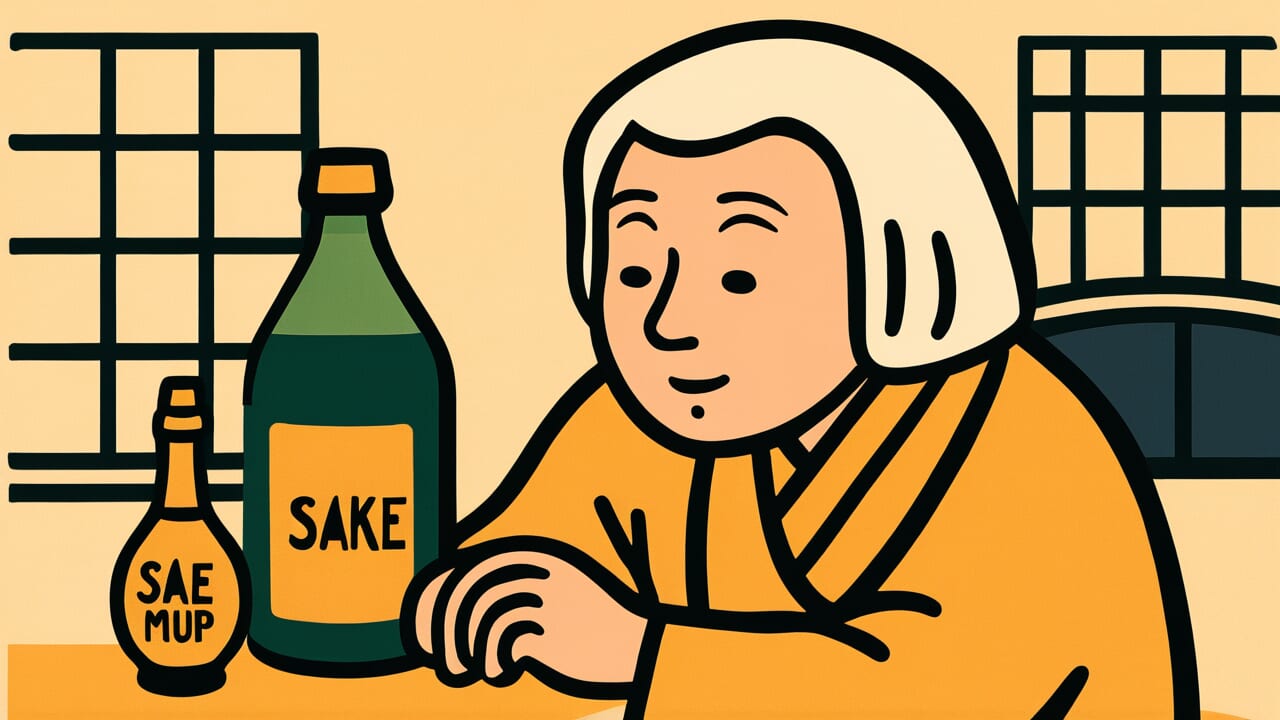How to Read “Sake is best aged, women are best mature”
Sake wa koshu, onna wa toshima
Meaning of “Sake is best aged, women are best mature”
This proverb means that both sake and women become more appealing with age. Just as aged sake has a smoother, deeper flavor than new sake, mature women have charms and depth that come from life experience.
This saying is used when you want to show that youth and newness aren’t the only valuable things. It recognizes qualities that only time can bring: composure, understanding, and conversational depth.
In modern times, this proverb should be understood beyond gender. It celebrates the human appeal and richness that grows with age, regardless of who you are.
Origin and Etymology
The exact origin of this proverb in written records is unclear. However, it was likely already widely used during the Edo period. Similar expressions appear in senryu and haikai poetry from that time.
This suggests the saying arose naturally among common people.
“Koshu” means sake aged for a long time. In the world of Japanese sake, aging removes harsh edges and creates mellow, deep flavors. During the Edo period, aged sake was sometimes valued more highly than new sake.
“Toshima” originally referred to women of mature age. Back then, it wasn’t necessarily negative. It often described attractive, experienced women.
This proverb reflects Edo period aesthetics. The culture didn’t only prize youth and newness. It also valued the depth and maturity that time creates.
Sake-making techniques had advanced, and people understood the value of aging. This same perspective was naturally applied to human appeal. The saying captures ancestral wisdom about the deep flavors that time brings to both sake and people.
Interesting Facts
Aged sake generally refers to sake matured for three years or more. Long aging turns it amber-colored and creates unique aromas and complex flavors. Recently, sake aged ten or twenty years has gained popularity, enjoyed like vintage wine.
In Edo period pleasure quarters, mature courtesans were considered more cultured and conversationally skilled than younger ones. They were actually quite popular.
These women excelled not just in appearance but in arts like shamisen, tea ceremony, and waka poetry. They could engage clients in intellectual conversation.
Usage Examples
- She’s become even more attractive after turning forty—truly “Sake is best aged, women are best mature”
- People say I have more depth now than when I was young. I guess it’s “Sake is best aged, women are best mature”
Universal Wisdom
This proverb has endured because it contains deep insight. Human value isn’t measured by simple standards. We’re instinctively drawn to new and young things, but we also have sensitivity to depth and maturity.
Just as sake matures over time, humans gain certain charms only through accumulated experience. This includes wisdom learned from failure, understanding gained from both joy and sorrow, and composure from continuous self-reflection.
Youth has its own brilliance, but that brilliance transforms into a different kind over time.
This truth transcends eras. Human growth requires time—this fact never changes. Some things can be obtained instantly, while others need time. Our ancestors learned this from the familiar practice of sake-making and expressed it as life wisdom.
Behind the psychology of chasing only surface beauty and newness, there’s actually a hidden longing for depth. This proverb quietly teaches the preciousness of what time creates, while acknowledging both aspects.
When AI Hears This
At the molecular level, sake aging actually increases disorder. Alcohol molecules, water molecules, and aroma compounds move vigorously, mixing and reacting chemically. This is entropy increase—growing randomness.
What’s fascinating is that this disordering process creates the complex flavors we find valuable.
Free energy in thermodynamics means “usable energy.” New sake has molecules still unsettled, with high free energy. Over time, molecules settle where they belong, and energy decreases.
But during this decrease, something happens: edges smooth into roundness, multiple aromas harmonize into depth. “Available deliciousness” reaches its maximum.
Human maturation has a similar structure. The sharp individuality and intense emotions of youth are high free energy states. Through experience, the heart’s molecular arrangement stabilizes and entropy increases.
You’re taking in the disorder of diverse experiences. But this creates “available charm”—flexible responsiveness and depth to understand complex emotions.
The universe’s laws command a one-way journey toward disorder. But along that path, moments of richest value bloom. This proverb intuitively grasped that physical truth.
Lessons for Today
This proverb teaches you not to rush. Social media overflows with praise for youth and newness, which can shake your heart. But value that requires time definitely exists.
Today’s experiences become tomorrow’s depth. Failures, setbacks, joys—everything matures you as a person. Your twenties have their appeal, your forties have theirs, and your sixties have theirs too.
Believe in the unique brilliance each age brings.
What matters isn’t just aging, but learning from experience and continuously refining your sensibilities. Try new things, connect deeply with people, face yourself honestly. These accumulations make you a person of depth.
You’re wonderful now, and you’ll be even more wonderful later. Time isn’t your enemy—it’s your greatest ally.



Comments